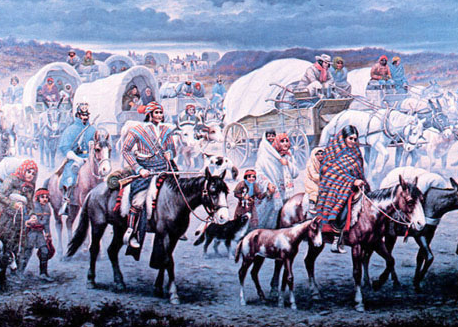For over a quarter of a century, Elizabeth Warren has described herself as a Native American. When recently asked to provide evidence of her ancestry, she pointed to an unsubstantiated claim on an 1894 Oklahoma Territory marriage license application by her great-great grand uncle William J. Crawford that his mother, O.C. Sarah Smith Crawford, Ms. Warren’s great-great-great grandmother, was a Cherokee.
After researching her story, it is obvious that her “family lore” is just fiction.
As I pointed out in my article here on Sunday, no evidence supports this claim. O.C. Sarah Smith Crawford had no Cherokee heritage, was listed as “white” in the Census of 1860, and was most likely half Swedish and half English, Scottish, or German, or some combination thereof. (Note, the actual 1894 marriage license makes no claim of Cherokee ancestry.)
But the most stunning discovery about the life of O.C. Sarah Smith Crawford is that her husband, Ms. Warren’s great-great-great grandfather, was apparently a member of the Tennessee Militia who rounded up Cherokees from their family homes in the Southeastern United States and herded them into government-built stockades in what was then called Ross’s Landing (now Chattanooga), Tennessee–the point of origin for the horrific Trail of Tears, which began in January, 1837.
This new information about Ms. Warren’s true heritage came as a direct result of a lead provided to me by William Jacobson over at Legal Insurrection, who in turn had received the information from one of his readers. Jacobson, who has questioned Warren’s explanation for her law faculty listing, calls this discovery “the ultimate and cruelest irony” of the Warren Cherokee saga.
Jonathan Crawford, O.C. Sarah Smith Crawford’s husband and apparently Ms. Warren’s great-great-great grandfather, served in the East Tennessee Mounted Infantry Volunteer Militia commanded by Brigadier General R. G. Dunlap from late 1835 to late 1836. While under Dunlap’s command he was a member of Major William Lauderdale’s Battalion, and Captain Richard E. Waterhouse’s Company.
These were the troops responsible for removing Cherokee families from homes they had lived in for generations in the three states that the Cherokee Nations had considered their homelands for centuries: Georgia, North Carolina, and Tennessee.
While these involuntary home removals were not characterized by widespread violence, the newly displaced Cherokee mothers, fathers, and children found an oppressive and sometimes brutal welcome when they finally arrived at the hastily constructed containment areas. An estimated 4,000 Cherokees were warehoused in Ross’s Landing stockades for months awaiting supplies and additional armed guards the Federal Government believed necessary to relocate them on foot to Oklahoma.
Jonathan Crawford most likely did not join the regular Army troops who “escorted” these Cherokees along the Trail of Tears. He did, however, serve once more with Major William Lauderdale’s re-formed Batallion of Tennessee Mounted Infantry Volunteer Militia. This group fought the Seminole Indians in Florida during the Second Seminole War. Crawford arrived in Florida in November, 1837, and served there for six months until his unit was disbanded in Baton Rouge, Louisiana the following May. (Note: It was not uncommon in those days for militia formed to serve for a limited period of time under specific commanders would reform later under the same commanders.)
Jonathan Crawford’s service as a Private in Captain Richard E. Waterhouse’s Company of Major William Lauderdale’s Battalion of Mounted Infantry in Brigadier General R. G. Dunlap’s East Tennessee Mounted Infantry Volunteers is confirmed by his appearance in the muster roll of the Brigade, taken around June of 1836. (Note that this transcription of the muster roll incorrectly lists the date as 1832.)
His service a year later (1837) in Major William Lauderdale’s Tennessee Volunteer Mounted Infantry (Five companies of volunteers, one of which was led by Captain Richard E. Waterhouse) is confirmed by his widow O.C. Sarah Smith Crawford’s 1851 pension application before the Bledsoe County, Tennessee commissioners
Meanwhile, William J. Crawford (Elizabeth Warren’s great-great grandfather who would, fifty-seven years later, falsely claim that his mother was Cherokee in that now-infamous 1894 Oklahoma Territory marriage license application) was born in Bledsoe County, Tennessee in 1837. This was just a few months after his father apparently helped remove thousands of Cherokees from their homes and a few months before his father went off to fight Seminole Indians in Florida.
His father, Jonathan Crawford, Elizabeth Warren’s great-great-great grandfather, died in Jackson County, Tennessee in 1841. His mother, O.C. Sarah Smith Crawford, died sometime between 1860 and 1870 – most likely in Bledsoe County, Tennessee.
Neither O.C. Sarah Smith Crawford, Jonathan Crawford, nor any of their seven other children, apparently ever claimed that O.C. Sarah Smith Crawford had Cherokee heritage.
As recently as two weeks ago, Ms. Warren publicly claimed to have Native American ancestry. In Dorchester, Massachusetts on April 27 at the Bricklayers and Allied Craftsmen Apprentice Training Center she stated, “I am very proud of my Native American heritage.” Yet, decades after she first made this same claim, it now appears that it is without any foundation.
It is time for Ms. Warren to publicly acknowledge the truth of her ancestry. It is time for her to admit that she has no Native American heritage that she can prove; and it is time for her to acknowledge instead, that she is likely a direct descendant of a Tennessee Militiaman who apparently rounded up the ancestors of those who truly have Cherokee heritage, the first step in their forced removal from the Southeastern United States to Oklahoma over the long and tragic Trail of Tears.
Michael Patrick Leahy is the Editor of Broadside Books’ Voices of the Tea Party e-book series, and author of Covenant of Liberty: The Ideological Origins of the Tea Party Movement.

COMMENTS
Please let us know if you're having issues with commenting.